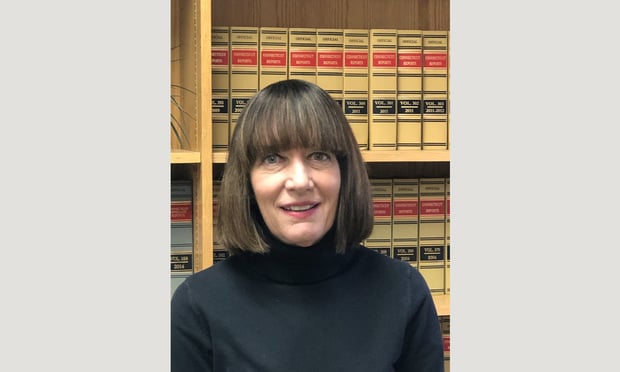Hope and Healing: The 2 Careers of Connecticut Judge Bernadette Conway
Bernadette Conway is the chief administrative judge for juvenile matters in New Haven's Juvenile Court and says her background as a nurse has made her more empathetic, and has helped her in her legal career.
January 27, 2020 at 02:28 PM
3 minute read
 Superior Court Judge Bernadette Conway. Courtesy photo
Superior Court Judge Bernadette Conway. Courtesy photo
A successful Superior Court judge for more than two decades, Bernadette Conway's first love was nursing.
And she has long maintained that the same empathy and compassion that drive successful nurses have made her a better judge and person.
Conway, who followed in the nursing footsteps of her aunt, Barbara Kettell, enrolled at the Massachusetts General Hospital School of Nursing. She later earned her bachelor's degree in nursing from Northeastern University in 1982, and still retains her nursing license.
The former emergency-room nurse continued working at Bridgeport's St. Vincent's Hospital while she went to law school. Now, at 61, she said her nursing background still factors into her current role as chief administrative judge for juvenile matters in New Haven Juvenile Court.
"I think I had pretty good compassion and empathy before I was a nurse," Conway said. "But as a nurse you see humanity's best and worst, just like in a courtroom setting. You learn to appreciate and become more accepting of the imperfections and tragedies of life."
In her current role, which Conway has had since September 2013, she sees sorrow, but also a lot of joy in working with the issues young people face.
The sorrow, she said, "is on the child protection side of the job when a child dies from neglect or abuse."
"It ties back to nursing, where I was used to life and death and seeing tragedies," Conway said. "I'm able to compartmentalize because of my nursing background. It was a good training ground for me."
Michael Dannehy, who has known Conway for 34 years, is a Superior Court judge in Hartford Juvenile Court. Dannehy said Conway's training as a nurse allowed her to "develop skills to really assess things quickly and focus on what needed immediate attention."
"It definitely helped her in cases that had medical issues," Dannehy said. "She is a great resource in trying to explain medical reports."
Conway said the state over the last several years has been able to decrease the number of children who have been arrested or entered into the juvenile justice system. One way that's been possible, the judge said, is via courthouse clinical coordinators, a relatively new concept.
"They have mental health backgrounds, and are able to assess children," Conway said. "They can give judges and lawyers some insight into what is going on, and what appropriate services and treatments they might need."
Conway received her law degree in 1985 from the University of Bridgeport School of Law, now Quinnipiac University School of Law. She was raised in Ohio, then in Enfield and Fairfield, Connecticut. She became a Superior Court judge in 1999, and resides in North Haven with her husband, Superior Court Judge Frank Iannotti, the presiding criminal judge in Waterbury.
Related stories:
Meet Judge Melanie Cradle, Whose Former Client Changed Her Life
Judge Mark Taylor's Stint in Apartheid South Africa Led Him to Bench
This content has been archived. It is available through our partners, LexisNexis® and Bloomberg Law.
To view this content, please continue to their sites.
Not a Lexis Subscriber?
Subscribe Now
Not a Bloomberg Law Subscriber?
Subscribe Now
NOT FOR REPRINT
© 2025 ALM Global, LLC, All Rights Reserved. Request academic re-use from www.copyright.com. All other uses, submit a request to [email protected]. For more information visit Asset & Logo Licensing.
You Might Like
View All


Discovery Seeks to Link Yale University to Doctor in Fertility Scandal
4 minute readTrending Stories
- 1Automaker Pleads Guilty and Agrees to $1.6 Billion in Payouts
- 2MLB's Texas Rangers Search For a New GC and a Broadcasting Deal
- 3Does the Treasury Hack Underscore a Big Problem for the Private Sector?
- 4Gen AI Legal Tech Startup Eve Raises $47 Million Series A Investment
- 5Hicks Johnson Promotes Lori Arakaki and Daniel Scime to Firm Partnership
Who Got The Work
J. Brugh Lower of Gibbons has entered an appearance for industrial equipment supplier Devco Corporation in a pending trademark infringement lawsuit. The suit, accusing the defendant of selling knock-off Graco products, was filed Dec. 18 in New Jersey District Court by Rivkin Radler on behalf of Graco Inc. and Graco Minnesota. The case, assigned to U.S. District Judge Zahid N. Quraishi, is 3:24-cv-11294, Graco Inc. et al v. Devco Corporation.
Who Got The Work
Rebecca Maller-Stein and Kent A. Yalowitz of Arnold & Porter Kaye Scholer have entered their appearances for Hanaco Venture Capital and its executives, Lior Prosor and David Frankel, in a pending securities lawsuit. The action, filed on Dec. 24 in New York Southern District Court by Zell, Aron & Co. on behalf of Goldeneye Advisors, accuses the defendants of negligently and fraudulently managing the plaintiff's $1 million investment. The case, assigned to U.S. District Judge Vernon S. Broderick, is 1:24-cv-09918, Goldeneye Advisors, LLC v. Hanaco Venture Capital, Ltd. et al.
Who Got The Work
Attorneys from A&O Shearman has stepped in as defense counsel for Toronto-Dominion Bank and other defendants in a pending securities class action. The suit, filed Dec. 11 in New York Southern District Court by Bleichmar Fonti & Auld, accuses the defendants of concealing the bank's 'pervasive' deficiencies in regards to its compliance with the Bank Secrecy Act and the quality of its anti-money laundering controls. The case, assigned to U.S. District Judge Arun Subramanian, is 1:24-cv-09445, Gonzalez v. The Toronto-Dominion Bank et al.
Who Got The Work
Crown Castle International, a Pennsylvania company providing shared communications infrastructure, has turned to Luke D. Wolf of Gordon Rees Scully Mansukhani to fend off a pending breach-of-contract lawsuit. The court action, filed Nov. 25 in Michigan Eastern District Court by Hooper Hathaway PC on behalf of The Town Residences LLC, accuses Crown Castle of failing to transfer approximately $30,000 in utility payments from T-Mobile in breach of a roof-top lease and assignment agreement. The case, assigned to U.S. District Judge Susan K. Declercq, is 2:24-cv-13131, The Town Residences LLC v. T-Mobile US, Inc. et al.
Who Got The Work
Wilfred P. Coronato and Daniel M. Schwartz of McCarter & English have stepped in as defense counsel to Electrolux Home Products Inc. in a pending product liability lawsuit. The court action, filed Nov. 26 in New York Eastern District Court by Poulos Lopiccolo PC and Nagel Rice LLP on behalf of David Stern, alleges that the defendant's refrigerators’ drawers and shelving repeatedly break and fall apart within months after purchase. The case, assigned to U.S. District Judge Joan M. Azrack, is 2:24-cv-08204, Stern v. Electrolux Home Products, Inc.
Featured Firms
Law Offices of Gary Martin Hays & Associates, P.C.
(470) 294-1674
Law Offices of Mark E. Salomone
(857) 444-6468
Smith & Hassler
(713) 739-1250











